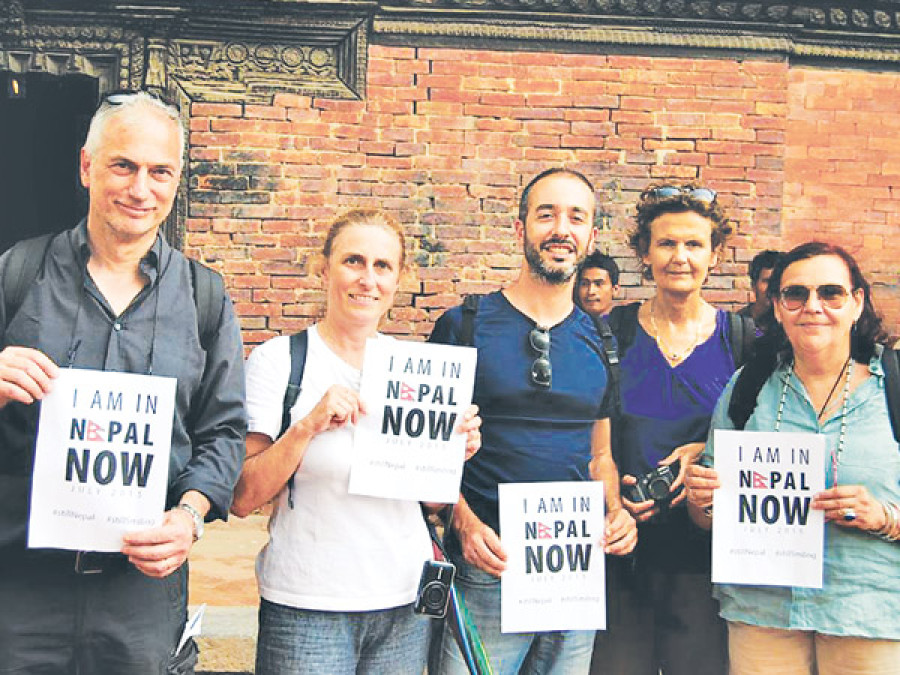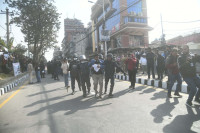Opinion
Together for tourism
Disasters can provide countries an opportunity to start afresh and build back better
Hari Man Lama
Any adverse impact on tourism, therefore, inevitably touches the economic life of the general people at all levels of society, which begins with the farmer growing organic vegetables, the craftsman making handicrafts, the porter on the mountains and the company that pays for these services. It is the visitor who comes to Nepal for its natural beauty who ultimately pays all of them. Nepal’s tourism is a virtual breadbasket and a natural representation of the country abroad. Hence, any detrimental effect on Nepal’s tourism has an ill effect on the whole national fabric. But what needs to be understood here is that the losses resulting from the earthquakes are not permanent problems and they are also not insurmountable. Everything that has been lost, except for human lives, can be restored with collective efforts involving all the stakeholders at both the public and private levels.
The physical infrastructure painstakingly built in the years gone by has, to some extent, been reduced to dust and debris. Many school buildings, government offices, private houses, several monuments of immense religious and cultural value have been fully or partially destroyed, creating an imperative necessity for repair or reconstruction. At a time when the government is engaged in the process of building new roads, airports, dams, irrigation projects and hydropower plants, the country is compelled to pay more attention to involving itself by creating and diverting fiscal resources towards recovery and reconstruction instead of concentrating on new infrastructural development.
On this front, the tourism sector is not an exception. This sector, too, has been badly hit and affected. But the damage has been exaggerated by some sections of the international media contrary to the actual ground situation. Though any loss is a loss and some have been severe, the tourism sector has not suffered to the extent that should discourage those who have emotional attachments and want to travel to Nepal from doing so. It is assumed that the recovery process in the travel sector will be faster than in many other areas since much of the basic products related to the tourism domain have not been affected. The immediate need is to effectively communicate this message abroad with safety assurances, first and foremost by the stakeholders in Nepal.
Our unique hospitality
The breathtaking Himalaya, extraordinary landscapes, heart-stopping views and our hospitable and congenial people are known to possess the spirit of generosity to offer any possible assistance to strangers in need.
The combination of one of the world’s best climatic conditions and a thriving ancient culture that has been passed down from generation to generation since prehistoric times is only a few of the many assets that have not been touched by the recent earthquakes or suffered any damage of a permanent nature. In this context, the instructions issued by the parliamentary committee to the Tourism Ministry to make the necessary arrangements to tell the outside community that Nepal is a truly safe destination is much appreciable.
The ground reality
What the earthquake has left behind in some parts of the country are landslips on a number of trekking trails, destruction to parts of several hotels, some collapsed temples, especially the golden pinnacles of multi-storied temples and monasteries, and collapsed walls at the durbar squares in the Kathmandu Valley. Even the government’s conservative estimates have put the losses caused to the tourism industry by the earthquake at only 15 percent. This is a clear indication that the damage to tourism is not as great as has been portrayed in and outside the country. There is no reason to panic because Nepal is not the first or the only country to be affected by natural calamities.
Decades of predictions by seismologists about an impending “big quake” in Nepal have been proved tragically accurate. Despite the long history of earthquakes in Nepal, the government neither made preparations to minimise possible losses nor prepare post-quake measures to deal with the problems that the people would suffer after a quake. But what needs to be truly noted in this regard is that the crisis was managed on a war footing during the search and rescue operations, even though proper planning was not up to the mark. The recent earthquakes that battered the country must be taken as a wakeup call to implement serious measures to protect valuable tourism assets and the lives and property of the people.
Common agenda
To this end, the common commitment of all the tourism-related actors is of paramount importance. The private sector including national and international airlines, travel agencies, trekking agencies and hotels and the Nepal Tourism Board and other tourism bodies will need to play a leading role in a united manner like never before. A high-level body consisting of the Tourism Ministry and its departments should be constituted to move along unified lines under the theme of “Together for tourism” to convey the message to the world that Nepal is one of the safest, friendliest and most beautiful countries to visit. As a country, we must learn to accept that, destructive as they may be, natural disasters are sometimes a blessing in disguise which offer a window of opportunity to rebuild. Nepal has now got a chance to usher in the winds of change.
Lama is a tourism entrepreneur




 10.12°C Kathmandu
10.12°C Kathmandu










